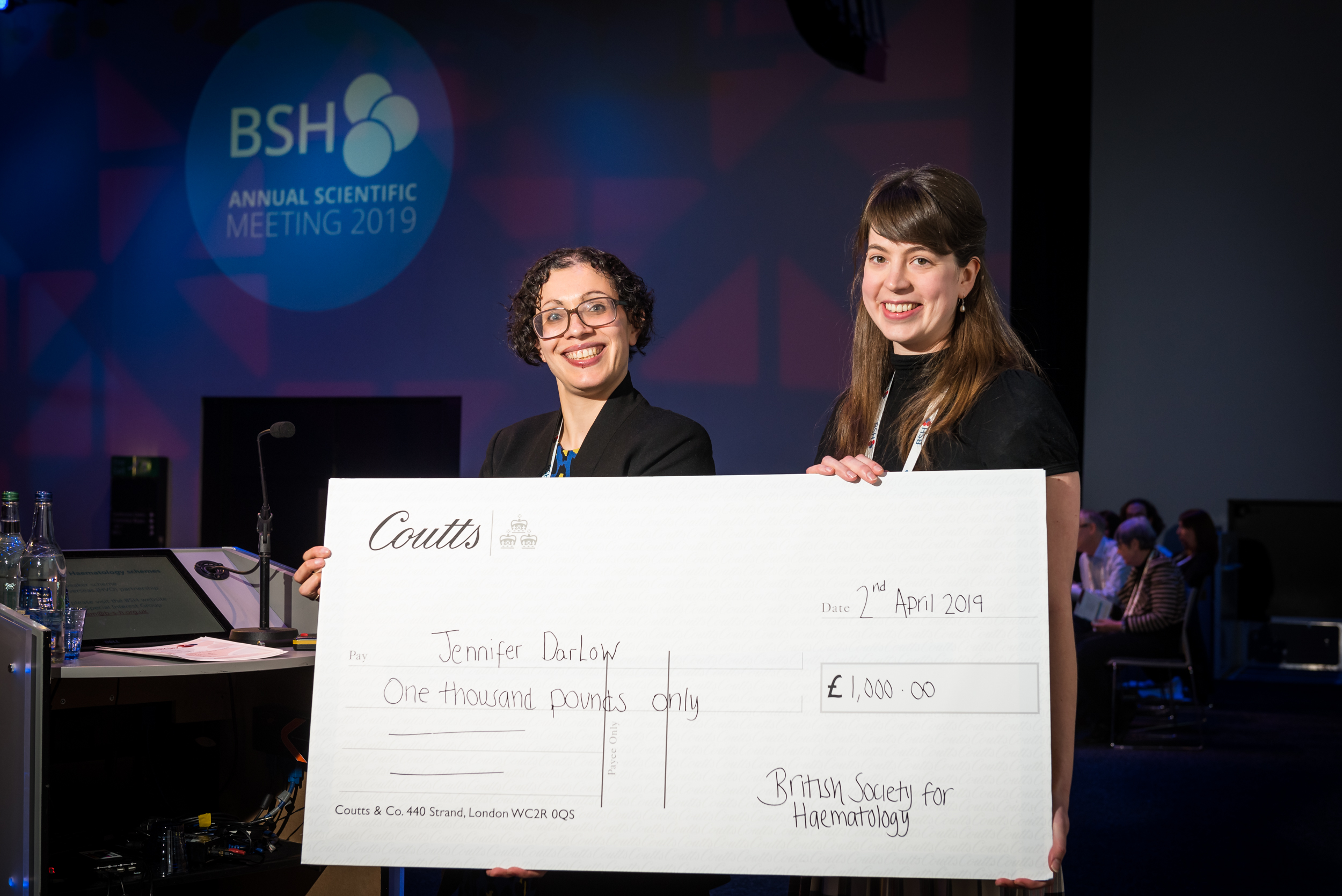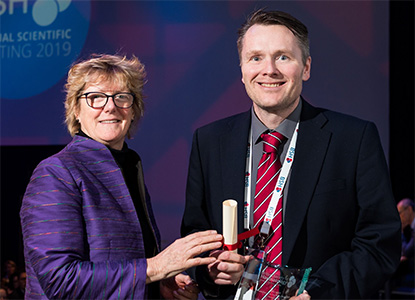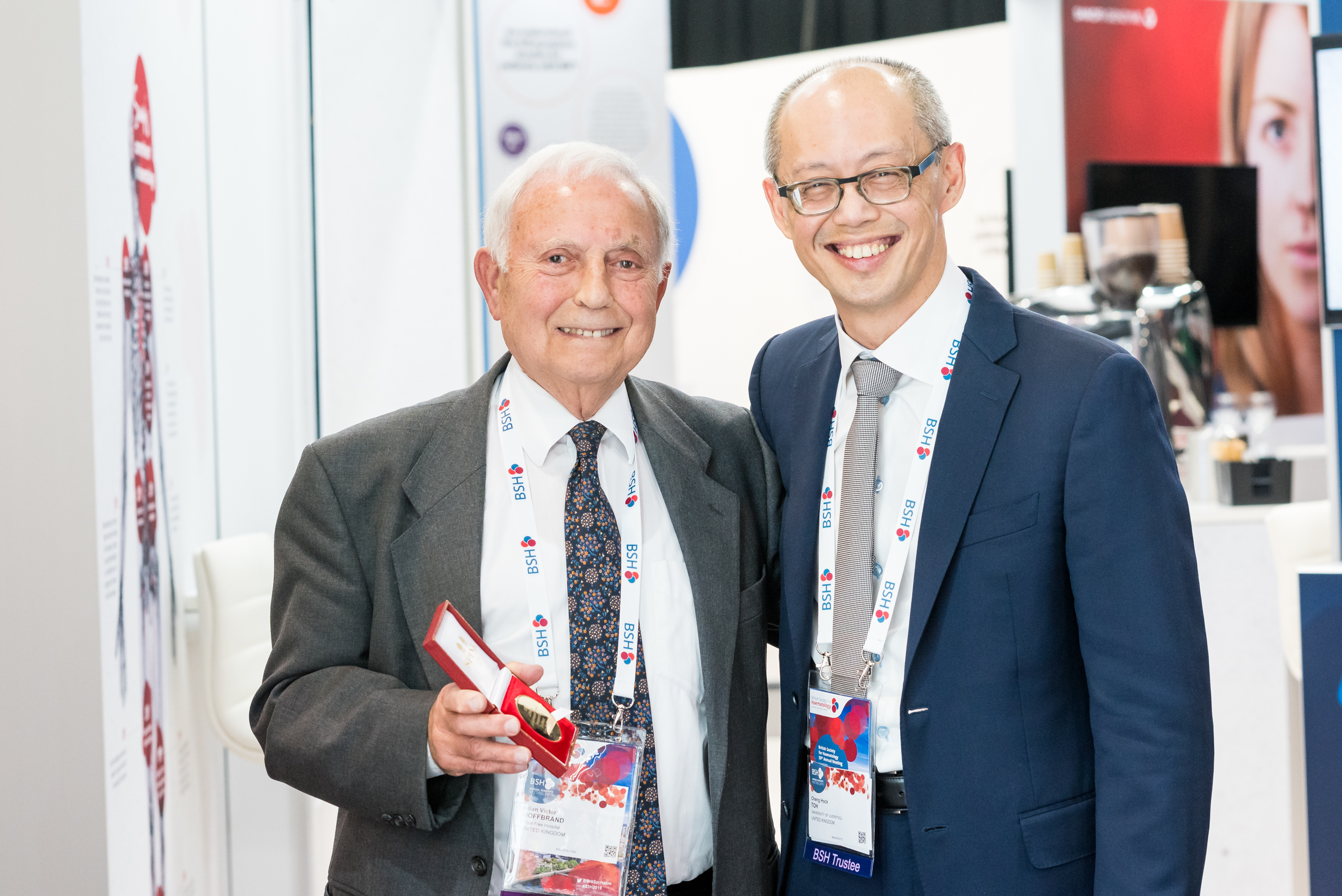At the BSH, we are keen to recognise those who go above and beyond and excel in their chosen area of haematology.
We have put together an exciting prizes and awards scheme to celebrate the success of members and non-members.
It is important that everyone, from students to senior haematology professionals, can showcase and gain recognition for their work.
Sign up for our Grants and Awards Newsletter on your My BSH page to receive notifications when awards are updated or announced.
External awards
The Royal College of Pathologists (RCPath)/Specialist Society Medical Elective small grant scheme was launched in 2022 to mark the College's Diamond Jubilee.
The BSH and RCPath jointly fund the grant, which offers up to £1,000 to help support undergraduate medical students who wish to undertake electives in haematology.
Electives may be clinical or research-based and may be undertaken in any part of the world.
Six awards are available.
The deadline for submissions is 30 September 2025 and the results will be announced on 5 November 2025.
Visit the RCPath website for more information and to apply.
The Society of Hematologic Oncology (SOHO) UK will hold a two-day meeting on 3rd and 4th of March 2026, featuring state of the art lectures and discursive discussions in all key areas of haemato-oncology and linked, centrally important, themes of genomics and translational science, cellular therapy and transplant with a specific focus on equity and diversity.
The emphasis on short talks, extensive case-based discussion and innovative teaching strategies has created a fantastically fresh meeting with a very attractive educational proposition. Besides the mainstream lecture theatre there will be a parallel running for people to engage in specific disease areas, broader healthcare issues plus sessions for mentoring and research.
SOHO UK is offering ten travel bursaries with one year's mentorship. A further twenty prizes for conference attendance are available.
Eligibility: senior trainees, clinical fellows in haematology and consultants in their first five years in post.
Application deadline: 30 October 2025
Results announced: 30 November 2025
Co-Chairs Professors Charles Craddock and Tony Goldstone invite you to apply for this first SOHO UK scholarship with awards.
National Clinical Impact Awards

National Clinical Impact Awards – Role of member organisations
The Advisory Committee on Clinical Impact Awards (ACCIA) has announced important changes to their processes for selecting individuals for their National Clinical Impact Awards.
They no longer accept citations, and member organisations may no longer provide ranked lists of candidates. They felt that neither of these processes had significantly impacted the outcome of the final rankings and were potentially dissuading some candidates from applying.
They still feel membership organisations have a role in advising candidates on applications.
The BSH strongly recommends candidates read the guidance provided by the ACCIA and complete their applications strictly according to this. Failure to do so results in otherwise strong applications being marked down harshly.
Applications for the 2024 National Clinical Impact Awards round have now closed.

The BSH Crucible Prize is an innovative trainee-led initiative with a £1,000 prize, where the five top abstracts are selected for oral presentation at our Annual Scientific Meeting.
The Prize aims to encourage reflection on what haematologists do and why they do it.
Those selected are questioned and judged by a panel of senior haematologists on the quality and originality of their content, presentation skills and response to questions.
The Prize is open to doctors in training, nurses and other healthcare professionals (at any stage of their career).

We invite undergraduate medical, biomedical and clinical science, physician associate and nursing students from UK schools to create a presentation on a subject chosen by the Education Committee.
Submissions can be posters, a PowerPoint presentation, a narrated slideshow, or other media as appropriate.
The winner will receive a prize of £500, and the runner-up will receive £250.
For the 2025 prize, we ask you to respond to the following:
Reflecting on a clinical encounter where you encountered a patient with a haematological disorder (e.g., anaemia, leukaemia, or sickle cell disease), describe the diagnostic process, your differential diagnosis, and how your understanding of haematology influenced your approach to patient care.
How did this experience shape your perspective on the role of haematology in general medical practice?
When submitting, please note:
Submissions will be marked for content, interest and structure.
Include details of your medical school, the course and your current year of study.
Note: Any use of AI must be declared and how it benefits your submission explained. We may check entries for plagiarism.
Eligibility criteria:
- Undergraduate medical students from UK medical schools.
- Healthcare scientists (HCPC registered biomedical and clinical scientists) Band 6 and below, undertaking any formal training programme under the remit of the Institute of Biomedical Science (IBMS), accredited undergraduate BSc degrees with registration portfolio and postgraduate MSc level with specialist diploma and trainees undertaking the British Blood Transfusion Society (BBTS) specialist certificate and the National School of Healthcare Science (NSHCS) Scientist Training Programme (STP).
- Physician assistants/associates (PAs) undertaking formal training in any recognised/accredited physician associate higher education institution prior to passing the PA National Examination.
Applications for the 2025 Student Communications Prize have now closed.
Student Essay Prize
From 2025, the Student Essay Prize has become the Student Communication Prize.
Previously, we invited essays on a topic agreed upon by the Education Committee.
You can read past years' winning essays below.

The NIHR-BSH Researcher of the Year award is a joint initiative between the BSH and the National Institute for Health Research (NIHR) to recognise recent contributions to clinical research efforts made by members of the BSH.
An award of £500 each will be given during the BSH Annual Scientific Meeting to up to three consultants, two trainees, and an allied health professional (AHP) or nurse selected by a joint panel of NIHR and BSH representatives.
Applicants must be active NHS consultants, trainees, nurses, physician associates, pharmacists or allied health professionals and should not hold a substantive academic appointment. They must also be members of the BSH.
We will announce the deadline for the 2026 award in due course.

The BSH Lifetime Achievement Award honours and recognises outstanding individuals who have made a major contribution to haematology in the UK (though the candidate does not have to be British).
Award criteria:
- The award is for exceptional contribution to UK and international haematology.
- Nominees can be from any discipline – scientist, nurse, medic, BMS, etc.
- Nominees do not need to have been a BSH member or UK citizen.
- The nominee should have spent the majority of their career in the UK.
- The award is not intended to be for academic work alone.
- The nominee should be in the latter part of their career or retired.
- The nominee cannot be a current trustee or an office bearer for the previous three years.
- It cannot be awarded posthumously.
Other information:
- The award will not necessarily be awarded annually.
- The award will be made at the BSH Annual Scientific Meeting.
Nominations for the 2026 award must be submitted by Wednesday, 31 December 2025.
For full guidance on the application process, view our information pack.
To submit your nomination, please download a nomination form and return it to
[email protected].

These are exciting awards created by the BSH Early Career Forum. Each award has a prize value of £1,500, plus expenses to attend the 2025 BSH Annual Scientific Meeting.
These two awards will be for projects or ideas in service improvement, leadership, and workforce rearrangement. Applicants are encouraged to think broadly and innovatively.
The prizes aim to foster professional development in students and people early in their careers and encourage reflection on how everyone can contribute to improvements in healthcare regardless of career stage.
The submission should relate to, or have the main focus on, haematology.
Eligibility:
This award is open to BSH members and non-members.
For the Undergraduate Achievement Award:
This prize is open to all healthcare students completing an undergraduate degree in their field.
For the Early Careers Achievement Award:
This prize is open to doctors in training, nurses and other healthcare professionals, a maximum of four years post-qualification.
Application process and timeline:
Applications have now closed and winners have been notified.

